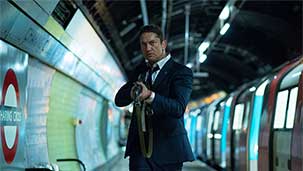Hey, Trevor. Me again. I know my overly enthusiastic response to Olympus Has Fallen might have come across a bit sarcastic, but it was nonetheless rooted in something very real: that film’s pedagogic adherence to action movie tropes. I gave you and the other filmmakers the benefit of the doubt, that it was big and silly and self-serious on purpose. And what I said about your score was absolutely true: if that film had been released two decades earlier, I would have worn out the soundtrack in my portable Discman.
So how do I judge the quality of London Has Fallen, the much-anticipated (sic) follow-up? It is, objectively, by virtually any critical standard, a pretty terrible movie. But it’s objectively terrible in a different way than Olympus.
The actors, I think, would agree with me. Their performances suggest that they know they’re in a terrible movie. Morgan Freeman floats ethereally through the frame like an Andy Serkis motion-capture performance of Morgan Freeman. Even his voice seems devoid of its usual God-like gravitas; he has given more affecting performances in credit card commercials. Aaron Eckhardt’s earnestness is hard to watch, and poor Melissa Leo has approximately one word of dialogue, which is spoken overtop someone else’s line of dialogue, and contributes approximately nothing to the plot, her character, or even the general ambience of the scene that she’s half-acting in.
(But there’s something about Gerard Butler, isn’t there? That kind of steady, monotone, autistic machismo—it’s the sort of thing that can work perfectly as a stabilizing force at the center of movies like this. He’s certainly the most invested performer—it’s a shame his investment pays such small dividends.)
The scale of the film is hard to pin down, too. It thinks it’s an epic. The entire city of London is blown to pieces; historic landmark after historic landmark is consumed by dust and flame. But the CGI in those sequences is really rough, barely at par with what we regularly see in late night parodies of such sequences. In an era when relatively small films like Ex Machina are winning visual effects Oscars, it feels strange, in a wide-release film like London Has Fallen, to see the seams so clearly.
And the first half of this movie is all seams. It looks God-awful. Not just the effects, either. The cinematography, too, belies visual flair and narrative cohesion for cramming as much as possible into each frame. Director Babak Najafi’s aesthetic seems to be quantity over quality, but he’s never able to make sense of the chaos the way good action directors can.
It’s a shame that things begin so poorly, because later in the film there are a few rather neat sequences, one of which is a sort of poor man’s Emmanuel Lubiezki long-take as Butler leads a British special forces team down a barricaded back alley guarded by innumerable international mercenaries (the film is very careful to point out that, though the mastermind behind this plot is a vengeful brown person from somewhere in the Middle-East, the army he has recruited, which Butler gleefully and gruesomely dispatches, is culturally diverse). Sure, the whole scene is basically a story mission from Call of Duty, and the whip-pans and foreground pass-bys that stitch the takes together are pretty obvious—but, still, points for ambition.
Sadly, it’s the only place ambition is evident. Maybe that’s the biggest bummer about this movie. Even if the original movie was, as I feared, “a misanthropic wannabe-blockbuster drowning in its own manufactured gravitas,” at least it wanted to be something. London Has Fallen aspires to nothing more than simply existing.
But how does your score compliment this mess? By being a bit of a mess itself. I get the impression that you, like the cast, like writers Creighton Rothenberger and Katrin Benedikt, returned to the franchise because it was easy, not because you had anything new to say. But I can’t blame you for phoning it in. How do you bring rhythm and coherence to a movie that’s as arrhythmic and incoherent as this? Just like you can see the seams in the special effects, you can hear the seams in the score: those triumphant, patriotic horns; those ominous strings; that thrumming beat—it’s all cut-and-pasted, a bad mix-tape recorded off the radio.
Sometimes the generic can be satisfying. Store brand pasta sauce, a white T-shirt, adult contemporary pop music—we value these things for their lack of complexity. They address a simple desire, and they address it directly. Olympus Has Fallen might have been such a pleasure. I had hoped (perhaps foolishly) that it was one. London Has Fallen, on the other hand, proves that sometimes the simplest objectives are the easiest to screw up.
Sincerely,

Jared







